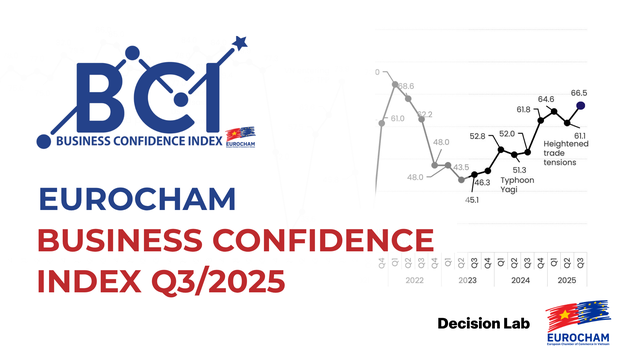Viet Nam remains most promising investment destination amid global headwinds
VGP - The European Chamber of Commerce in Viet Nam (EuroCham) officially unveiled the Q3 2025 edition of the Business Confidence Index (BCI) which climbed to 66.5, surpassing pre-tariffs level and reaching its highest in three years – showcasing resilience and adaptability amid global headwinds and evolving U.S. tariff pressures.

The Q3 2025 BCI ultimately reaffirms Viet Nam's position as one of the most promising destinations for European investment in Asia. Yet, as the world grows more volatile and unpredictable, optimism must be anchored in continued reform and resilience.
Respondents consistently stress that Viet Nam's long-term competitiveness depends on regulatory predictability, consistency across provinces, and efficient administrative procedures.
Specifically, 80 percent of respondents are optimistic about their prospects over the next five years, and 76 percent would recommend Viet Nam as an investment destination. It affirms that Viet Nam's structural story still holds strong. The recent upgrade of Viet Nam's stock market classification by FTSE Russell – from Frontier to Secondary Emerging Market status – underwrites the findings of our BCI survey. It signals growing confidence from international investors and recognizes Viet Nam's rising importance as an investment destination for future business.
This renewed confidence aligns with Viet Nam's broader economic ambitions. Nearly half of respondents (42 percent) believe that Viet Nam will reach its ambitious GDP growth target of 8.3–8.5 percent for 2025, while 23 percent remain neutral and 35 percent express some reservations.
EU Ambassador to Viet Nam, Julien Guerrier, added: "Viet Nam's growth trajectory is impressive, yet there is scope to unlock further the huge potential of the EU–Viet Nam partnership with predictable and transparent rules in line with international standards, and the involvement of the business community in the preparation of new regulations.
"This steady confidence is particularly striking in a world defined by volatility and uncertainty – where the ripple effects of geopolitics, technological shifts, and climate change are rewriting trade and investment strategies across continents," remarked EuroCham Chairman Bruno Jaspaert.
The BCI Q3 2025 report, conducted by Decision Lab, goes beyond macroeconomic sentiment to capture structural shifts quietly reshaping Viet Nam's business environment: forward-looking reforms in visa and work permit policies, growing momentum for green investment, and the ongoing digitalization of administrative procedures. Together, these changes reflect how European investors perceive Viet Nam's future: full of promise, yet not without friction.
The shifting trade landscape is beginning to leave its mark. As the U.S. implements new tariff measures and global supply chains realign, 31 percent of surveyed businesses reported a net negative impact on their financial performance – a sizable adjustment compared to 15 percent in Q2 2025. Interestingly, the share of firms seeing a net positive impact also followed a similar trend, rising to 9 percent from 5 percent in Q2, reflecting the potential upside for companies able to reposition themselves amid global trade re-routing.
Despite these adjustments, relocation remains limited: only 3 percent are considering moving operations out of Viet Nam, while another 3 percent are considering relocating into or within the country, reaffirming Viet Nam's reputation as a resilient and reliable base for production and investment.
While clarity around U.S. "transshipment" rules and future trade deals remains limited, most firms report no major change to their investment plans or operations. Regulatory compliance, market dynamics, and sourcing strategies have become "slightly more challenging," but few see these headwinds as strong enough to alter their long-term commitment to Viet Nam.
Administrative reform: progress and remaining frictions
A major step forward was made in August 2025 when the Government introduced three new decrees designed to modernize visa and work-permit regulations and make the process more predictable.
Decree 219 empowers local authorities to issue work permits, enables online applications, reduces experience requirements for foreign experts in prioritized and emerging fields, expands categories eligible for exemptions, and simplifies paperwork. Decree 221 introduces a limited-term visa exemption for select groups of foreigners contributing to Viet Nam's socio-economic development, reflecting a more flexible approach to attracting international talent. Meanwhile, Decree 229 expands Viet Nam's visa-exemption policy to include 18 EU member states, further strengthening the link between European and Vietnamese mobility.
Almost half (48 percent) of the firms surveyed reported that these policy changes have already made a positive difference in their operations, while 42 percent said the impacts are yet to materialize, often due to transitional administrative issues. Nevertheless, these decrees represent a substantial leap toward more open, business-friendly mobility regulations, echoing EuroCham's long-standing recommendations in its annual Whitebook publications.
Chairman Jaspaert said: "As Viet Nam aspires to become a high-income, developed nation within the next two decades, talent mobility and skills transfer must be placed at the heart of this journey. These reforms are critical to ensuring that international expertise can flow freely to where it is most needed, unlocking innovation and strengthening Viet Nam's private-sector capacity."
